Manmohan Singh's decisions that shaped a billion lives
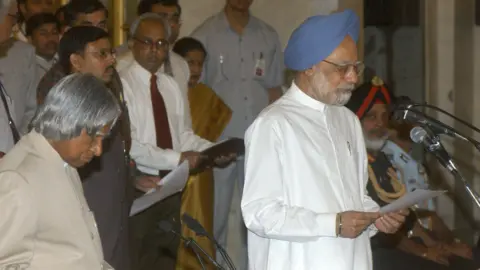 Getty Images
Getty ImagesPeople in India are reflecting on former Indian Prime Minister Manmohan Singh's contribution to the country since his death on Thursday evening.
Singh, who held the top post for two consecutive terms between 2004 and 2014, was seen as an architect of India's economic liberalisation which changed the country's growth trajectory.
The first prime minister since Jawaharlal Nehru to return to power, Singh was also the first Sikh to assume the top office.
Known as a soft-spoken technocrat, he had earlier headed India's central bank, served as a finance secretary and minister, and led the opposition in the upper house of parliament.
Here are five milestones from Singh's life that shaped his career and had a lasting impact on more than a billion Indians.
Economic liberalisation
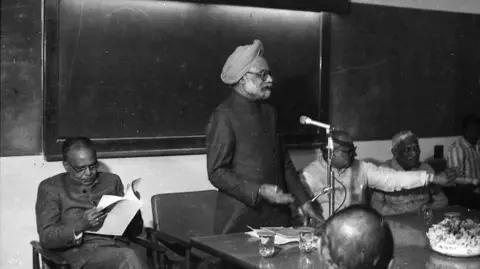 Getty Images
Getty ImagesSingh was appointed finance minister in 1991 by the Congress party-led government under Prime Minister PV Narsimha Rao.
India's economy at the time was facing a serious financial crisis, with the country's foreign reserves at a dangerously low level, barely enough to pay for two weeks of imports.
Singh led the initiative to deregulate the economy to avoid its collapse, which he argued was otherwise imminent. Despite stiff opposition from members of his government and party, Singh prevailed.
He took bold measures that included devaluing the currency, reducing import tariffs and privatising state-owned companies.
He was famously quoted as saying in parliament during his first budget speech in 1991 that "no power on Earth can stop an idea whose time has come".
Later, as prime minister, Singh continued to build on his economic reform measures, lifting millions of Indians out of poverty and contributing to India's rise as one of the world's fastest-growing major economies.
Reluctant prime minister
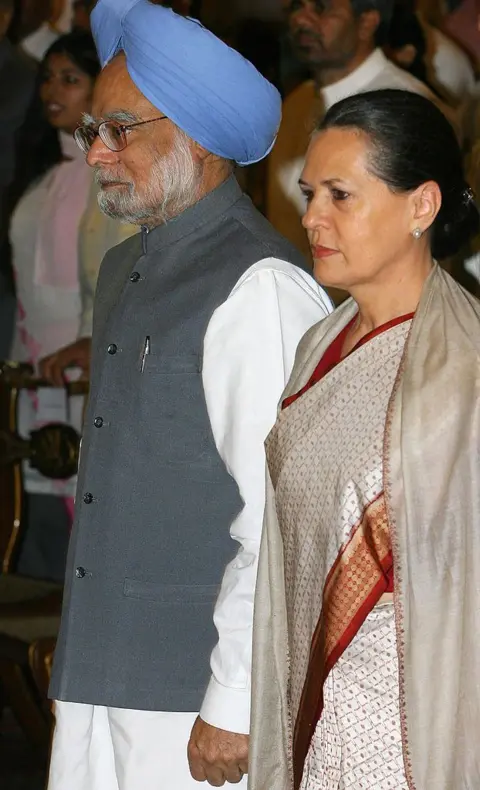 Getty Images
Getty ImagesThe Congress party made a comeback in 2004 elections, handing a surprise defeat to the government led by Atal Bihari Vajpayee of the Bharatiya Janata Party (BJP).
Congress chief Sonia Gandhi was widely expected to head the government, but many members of the outgoing ruling party raised questions over the fact that she was born in Italy. She declined to take up the post and instead proposed Singh's name, who was seen as a non-controversial, consensus candidate of great personal integrity.
In the next parliamentary election, he helped his party win a bigger mandate, but critics often termed him a "remote-controlled" prime minister managed by the Gandhi family.
Singh often refused to comment on such allegations and kept his focus on the job.
He may have started his first stint as prime minister with some reluctance but he soon stamped his authority on the top job.
Singh's tenure, particularly between 2004 and 2009, saw the country's GDP grow at a healthy average pace of around 8%, the second fastest among major economies.
He took bold decisions on reforms and brought more foreign investment into the country. Experts credit him for shielding India from the 2008 global financial crisis.
But his second term, in an alliance with a disparate group of parties, was marked by allegations of corruption against some of his cabinet ministers, though his personal integrity was never questioned.
In response to these allegations, he told journalists in 2014 in his last press conference as prime minister that he hoped history would judge him differently.
"I honestly believe that history will be kinder to me than the contemporary media, or for that matter, the opposition parties in parliament," he said.
"I think taking into account the circumstances and the compulsions of a coalition polity, I have done as best as I could do under the circumstances."
Rights to education, information and identity
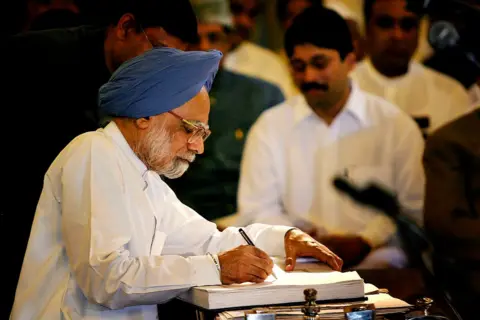 Getty Images
Getty ImagesAs prime minister, Singh took several far-reaching decisions that continue to impact the health of Indian democracy even today.
He introduced new laws that strengthened and guaranteed the right to seek information from the government, allowing citizens an extraordinary power to hold officials accountable.
He also introduced a rural employment scheme which guaranteed livelihood for a minimum of 100 days, a measure economists said had a profound impact on rural incomes and poverty reduction.
He also brought in a law that guaranteed the right to free and compulsory education for children between the ages of 6 and 14, significantly reducing the school dropout rates.
His government also introduced a unique identity project called Aadhar to improve financial inclusion and delivery of welfare benefits to the poor. The current federal government, run by Prime Minister Narendra Modi, has continued to keep Aadhar as a cornerstone for many of its policies.
Apology for anti-Sikh riots
In 1984, prime minister Indira Gandhi was assassinated by her Sikh bodyguards to avenge a military action she had ordered against separatists hiding in Sikhism's holiest temple in northern India's Amritsar.
Her death sparked massive violence that resulted in the death of more than 3,000 Sikhs and a widespread destruction of their property.
Singh formally apologised to the nation in 2005 in parliament, saying the violence were "the negation of the concept of nationhood enshrined in our constitution".
"I have no hesitation in apologising to the Sikh community. I apologise not only to the Sikh community, but to the whole Indian nation," he said.
No other prime minister, particularly from the Congress party, had gone this far to apologise in parliament for the riots.
Deal with US
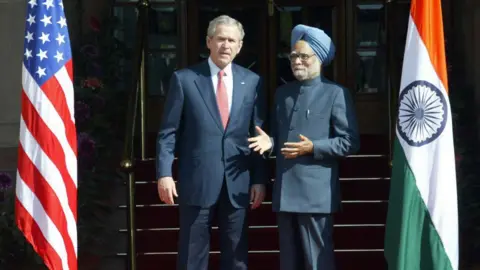 Getty Images
Getty ImagesSingh signed a historic deal with the US in 2008 to end India's nuclear isolation after its 1998 testing of the weapon system.
His government argued that the deal wouldhelp meet India's growing energy needs and sustain its healthy growth rate.
The deal, seen as a watershed moment in the India-US relations, promised to grant a waiver to India to commence civilian nuclear trade with the US and the rest of the world.
But it faced massive opposition, with critics of the deal alleging that it would compromise India's sovereignty and independence in foreign policy. In protest, the Left Front withdrew support from the governing alliance.
Singh, however, managed to save both his government and the deal.
